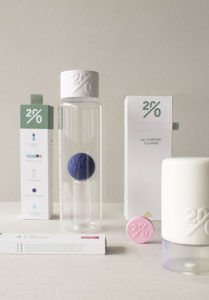This Package Design Could be the Solution to Reduce Carbon Footprint
Next time you’re in the shower, take a close look at your shampoo bottle ingredients. Have you ever considered that the number one ingredient in your shampoo to your mouthwash to your laundry detergent is WATER? In fact, almost all liquid products contain on average 80% water. Now take that same shampoo bottle and imagine it 80% lighter in weight without the water.
This is the mindset behind innovative thinker, Mirjam de Bruijn. The Netherland’s design student’s project, Twenty suggests a new packaging concept which typical liquid based products would be sold in solid form. The consumer would simply add water to compressed tablets, pellets, or capsules containing the concentrated product, ultimately creating their favorite products themselves at home.
Reducing the physical weight and packaging size of products has multiple benefits.
Firstly, overall costs decrease drastically. According to GreenBiz shipping accounts for 90% of global transport of goods. Because shipping, packaging, and labor costs would decrease, these savings would be reflected in the price consumers pay and because the product is lighter in weight and smaller in packaging, this allows more product to be packed and shipped faster.
Secondly, carbon footprint is automatically decreased. Not only is all of de Bruijin’s packaging is made of materials that can be recycled, like cardboard, as well as reusable plastic bottles; the fuel which ships the products is decreased. Also, because the product does not take up much space, consumers would likely purchase multiple units simultaneously rather than buying one bottle at a time which results in less trips to the store, and less fuel used to get to the store. If de Bruijin’s concept was to be widely accepted it’s predicted her sustainable designs would reduce global carbon emissions by 4% globally.
“By raising awareness I hope to activate consumers in such a way that one day the concept of Twenty will become a standard for household goods” – de Bruijn








